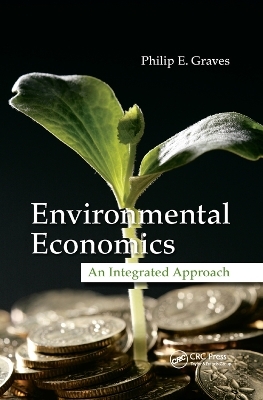
Environmental Economics
CRC Press (Verlag)
978-0-367-37960-5 (ISBN)
- Titel z.Zt. nicht lieferbar
- Versandkostenfrei innerhalb Deutschlands
- Auch auf Rechnung
- Verfügbarkeit in der Filiale vor Ort prüfen
- Artikel merken
The book discusses why we have environmental problems and how we would optimally react if we had perfect information about environmental benefits and costs. It then describes methods in use—and their flaws—to acquire the information necessary to enact environmental policy. The book starts with a categorization of goods types, concluding that environmental problems stem from non-excludable goods that are either rivalrous or non-rivalrous. The author introduces the Coase Theorem in the first chapter, then details how households and firms would behave when facing a zero price on pollution versus a price on pollution set equal to presumed known marginal damages. He connects the economic system with the environmental system by aggregating up from individual decisions to the aggregate market system and the aggregate environmental quality.
But, of course, the information available is rarely perfect. Clarifying the information difficulties faced by households, firms, and policy makers, the author recognizes that there is both a knowledge gap and a communication gap. He then covers the methods policy makers employ in an attempt to gain sufficient insight into marginal benefits and marginal costs to properly set a marginal damage tax, properly limit emission rights, or properly provide public goods.
Graves, Philip E.
Environmental Policy with Perfect Information: The Basic Theory. Introduction. The Economy and the Environment: Uncontrolled Case (Pre-Institution). The Economy and the Environment: The Case of Optimal Controls (Post-Institution). Provision of Public Goods (Pre-Institution and Post-Institution). The Role of Time in Economics: Interest Rates, Compounding, and Discounting. Benefit-Cost Analysis with Perfect Information. Environmental Policy with Imperfect Information. Information Difficulties: The Individual Household and the Benefits of Environmental Policies. Information Difficulties: The Individual Firm and the Costs of Environmental olicies. Information Difficulties: The Policy-Maker. Valuation--Acquiring Information about Environmental Benefits. Overview of valuation Methods. Environmental Valuation: Voting and Referenda. Environmental Valuation: Constructed Markets. Environmental Valuation: The Sum of Specific Damages Approach. Environmental Valuation: The Hedonic Method. Environmental Valuation: The Travel Cost Method. Do Decision-Makers "Care" about Efficiency? Impact of Concerns about Equity on Environmental Policy. An Interdisciplinary Environmental Policy Analysis Methodology. Epilog. An Overall Assessment of the State of Environmental Policy Making. The Past and the Future.
| Erscheinungsdatum | 18.09.2019 |
|---|---|
| Verlagsort | London |
| Sprache | englisch |
| Maße | 156 x 234 mm |
| Gewicht | 453 g |
| Themenwelt | Naturwissenschaften ► Biologie ► Ökologie / Naturschutz |
| Recht / Steuern ► EU / Internationales Recht | |
| Recht / Steuern ► Öffentliches Recht ► Umweltrecht | |
| Technik ► Umwelttechnik / Biotechnologie | |
| Wirtschaft ► Volkswirtschaftslehre | |
| ISBN-10 | 0-367-37960-0 / 0367379600 |
| ISBN-13 | 978-0-367-37960-5 / 9780367379605 |
| Zustand | Neuware |
| Haben Sie eine Frage zum Produkt? |
aus dem Bereich


